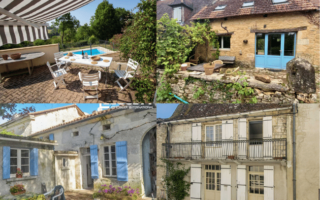Case law latest
Keep on top of the latest developments in French law with David Anderson’s round-up of recent cases and proposed legislation
This is a short summary of a few recent court cases and proposed laws that could affect owners of French property, with some practical advice in relation to them.
Diagnostic searches
In this case, a purchaser bought a house under a contract which contained a clause exempting the sellers from any liability for vices cach�s, which means any hidden faults. Shortly after the purchase, the buyer discovered that there was asbestos in the premises. The buyer sued the sellers as well as the company that carried out the diagnostic search.
The diagnostic search had not revealed any asbestos. Diagnostic searches in France are part of the conveyancing process and are typically commissioned by the seller. A form of survey, they are collectively known as the dossier de diagnostic technique (DDT).
The Supreme Court decided that neither the sellers nor the company which carried out the asbestos diagnostic report were liable. The court ruled that the sellers had carried out their obligation to provide such information as they were aware of and, because there was a clause in the contract exempting them from any hidden faults, they could not be found liable.
The company that carried out the diagnostic search for the asbestos had carried out what was required of it under the relevant French law, that is to find any asbestos that was accessible without having to carry out any works that would destroy the property. It had not been proved that any visible asbestos was present.
This goes to show that you cannot fully rely on the diagnostics and it is very difficult to claim compensation from the companies that carry out these reports. It may be sensible to have a British-style survey done on the property, which is unusual in France, but note that most surveys will also be done without causing any damage to the house, so defects may remain hidden.
In any case, be mindful of floors that have a new surface laid over them, this may be hiding a termite problem, while plasterboard covering walls may be concealing asbestos. If there is a mention of traces of, say, asbestos being detected, you may decide this has to be looked into further.
It is difficult to change the standard clauses regarding the limits on sellers’ liability for the condition of the property. In practice, it is ‘buyer beware’ so if there is anything suspicious, ask the seller to agree to further checks.
The diagnostic searches are technical and it can be difficult for people with limited French to fully understand them. It is therefore advisable to make sure you understand what is in them.
Capital gains tax
A new exemption has been inserted in the French tax code for second properties. The new rule provides that on the first sale of a property that is not the seller’s main residence, if the seller has not been the owner of his main residence for four years before the sale, there is to be an exemption from capital gains tax on the sale of the property.
The exemption is limited to the fraction of the sale price which the seller, within a period of 24 months from the sale, uses to buy or build a residential property, which from the date of completion or acquisition, he uses as his main residence.
In other words, if the sale price of the property is entirely used to purchase another property which is used as a main residence, then no capital gains tax will be payable in France on the sale of the first property. Rules have not yet been made as to how this is to apply, especially to non-residents.
This last-minute amendment to the new capital gains law looks like it could be useful to some UK sellers, although the way it will work has not yet been set out. Assume you wanted to sell a French property and buy a main residence in the UK; would the tax have to be held in France and only released once you could show the French tax authorities you had bought a main residence? How would you prove this? This is a significant point which is going to become more important.
communications diagnostic
A draft law has been submitted in the French senate for a ‘computer diagnostic’. This would be added to the other diagnostics the seller is obliged to obtain, such as for lead, asbestos and termites. Currently, you also have to obtain an energy diagnostic and also one for natural risks, such as earthquakes.
The new diagnostic will give information to purchasers about the accessibility of the property to communication services, such as the internet. Implementation of such a diagnostic is currently being studied.
Renting out flats
In this case, apartment owners had rented out their properties on a furnished basis. The syndicat (management company) opposed this on the basis that the co-propri�t� rules (like the rules in a lease) provided that the flats could only be occupied “in a bourgeois fashion by people of good lifestyle and morals”. They could not be rented out furnished without the authorisation of the majority of the flat owners.
The Court of Appeal decided that the owners could rent their properties out furnished in this way and decided that the restriction on their right to rent was not justified by the use of the building, and that the clause restraining the rights of the co-owners on the private parts which they owned was invalid.
Take care when buying properties in ‘bourgeois’ buildings if you are planning to rent them out as holiday rentals which may annoy neighbours. In these cases, the court may well be more sympathetic to preventing this use, as it is not what the building is intended to be used for.
Right of first refusal
The SAFER organisation has a right of first refusal on the sale of agricultural property. This right can extend to farmhouses and larger buildings with agricultural curtilage.
At the moment, the right of pre-emption only applies if the entire legal title is sold. If a usufruit (life interest) or a nue-propriet� (ownership subject to the life interest) is sold then SAFER has no right of pre-emption. (When the life interest comes to an end, i.e. when the person with the life interest dies, the other person who has the nue propriet� then owns the property outright.)
It has been possible to get round the SAFER rules by selling a usufruit and then sometime later, in a supposedly unconnected transaction, selling the nue-propriet�.
Because of the spread of this practice, which undermines SAFER’s control, a new law is being considered which would give SAFER the right to pre-empt such disposals.
When buying a country property, always remember to ask what the position is with SAFER. This has usually been dealt with. Be particularly careful if you are buying a house from one seller and adjoining land from another. You do not want to end up having to buy the house but not being able to buy the adjacent agricultural land because SAFER pre-empts you. SAFER is more likely to buy (cheaper) agricultural land than property that comes with a house.
Wealth tax loophole
The finance law passed in 2011 has ended a useful wealth tax-saving loophole. It used to be possible for foreigners to purchase very expensive properties using a French SCI (soci�t� civile immobili�re) and then lend money to the SCI to purchase the property.
This shareholder loan to the SCI was deductible when valuing the shares in the SCI, which meant that, in practice, anyone using this route would not pay wealth tax until the property increased considerably in value from the date of purchase.
Many commentators say this loophole has now ended because of last year’s Finance Act. This is not, however, the case and planning opportunities based on this structure are still available which are simple and likely to work.
Wealth tax planning is technical and requires expert advice; it really only starts to become worthwhile once your investment in a property is for over €3 million.
David Anderson is a solicitor and chartered tax adviser at Sykes Anderson LLP Tel: 020 3178 3770 www.sykesanderson.com
Share to: Facebook Twitter LinkedIn Email


